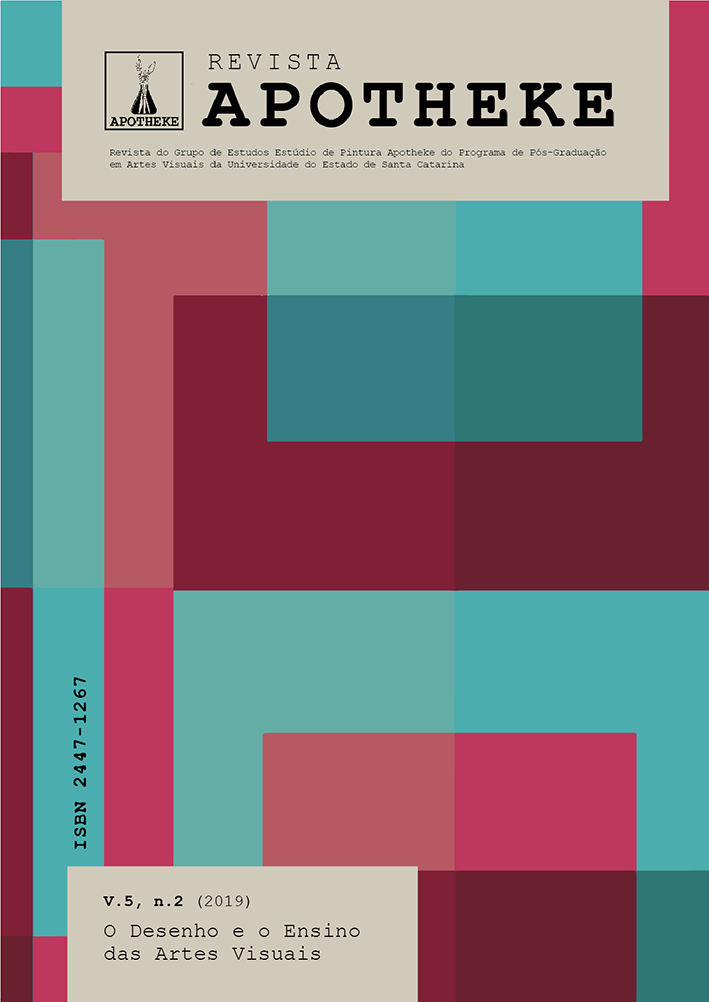Desenho e linha: modos de Pensamento e Expressão
DOI:
https://doi.org/10.5965/24471267522019101Palavras-chave:
linha, desenho, extensão do pensamento, expressãoResumo
Neste artigo são apresentadas algumas considerações sobre o conteúdo abordado no segundo capítulo da minha tese[1], que se estende às questões da linha no seu âmbito geral e no específico do desenho, bem como uma reflexão sobre o ato de desenhar. O estudo envolve o tema do desenho como sendo um meio direto de expressão, e a presença da linha atuando na ordenação do nosso pensamento abstrato. Questiona-se em que medida a proximidade com o desenho no dia a dia, quer pelo seu caráter de anotação ou orientação, poderia ativar a sua prática como meio de criação nas artes. Finalizo, apresentando três artistas contemporâneos que trabalham a problemática da linha na expansão do campo do desenho.[1] Ausências no Desenho: áreas de não-desenho, apagamento e desgaste. Defendida em outubro de 2014 – ppgav-UFRGS.
Downloads
Referências
BENJAMIN, Walter. Sobre a Pintura ou Sinal e Mancha. in: MOLDER, Filomena. Matérias Sensíveis. Lisboa: Relógio D' Agua Editores, 1999.
BUTLER, Connie e DE ZEGHER, Catherine. On line: Drawing trough the Twentieth Century. Publicado por The Museum of Modern Art, Nova York, 2010.
BROOKS, Alfred. Drawing. in The Art Bulletin vol. 2, n.3. New York: College Art Association, março de 1920).
CATTANI, Icleia. O desenho como abismo. in Revista Porto Arte v 13, nº 23 – Porto Alegre, 2005. Universidade Federal do Rio Grande do Sul. Instituto de Artes.
DUZZO, Flávia. Ausências no desenho: áreas de não desenho, apagamento e desgaste. Tese de Doutorado. Universidade Federal do Rio Grande do Sul – Instituto de Artes – Programa de Pós-graduação em Artes Visuais, Porto Alegre, Brasil. 2014.
GODOY, Vinícius. Iberê. Influência é desenho. Tese de Doutorado. Universidade Federal do Rio Grande do Sul – Instituto de Artes – Programa de Pós-graduação em Artes Visuais, Porto Alegre, Brasil. 2009.https://lume.ufrgs.br/handle/10183/2/browse?type=author&value=Godoy%2C+Vin%C3%ADcius+Oliveira. Consulta: 05/07/2019
HOUAISS, Antônio. Dicionário Houaiss da Língua Portuguesa. Rio de Janeiro, Ed. Objetiva, 2009.
MOLINA, Juan José Gómez. Las lecciones Del dibujo. Ediciones Cátreda. Madrid-Espanha, 2006.
PAREYSON, Luigi. Teoria da Formatividade. Rio de Janeiro:Vozes,1993.
TONE, Lilian(org.) William Kentridge Fortuna. Catálogo da exposição, 2012.
VINCI, Leonardo da. The Notebooks of Leonardo Da Vinci.
Downloads
Publicado
Como Citar
Edição
Seção
Licença
Copyright (c) 2019 REVISTA APOTHEKE

Este trabalho está licenciado sob uma licença Creative Commons Attribution-NonCommercial 4.0 International License.
Os autores de trabalhos submetidos à Revista APOTHEKE autorizam sua publicação em meio físico e eletrônico, unicamente para fins acadêmicos, podendo ser reproduzidos desde que citada a fonte. Os mesmos, atestam sua originalidade, autoria e ineditismo.
Os artigos publicados pela revista são de uso gratuito, destinados a aplicações
acadêmicas e não comerciais. Os direitos autorais são todos cedidos à revista. Os artigos cujos autores são identificados representam a expressão do ponto de vista de seus autores e não a posição oficial da Revista Apotheke. O(s) autor(es) se compromete(m) a sempre que publicar material referente ao artigo publicado na Revista Apotheke mencionar a referida publicação da seguinte forma:
"Este artigo foi publicado originalmente pela revista Apotheke em seu volume (colocar o volume), número (colocar o número) no ano de (colocar o ano) e pode ser acessado em: http://www.revistas.udesc.br/index.php/APOTHEKE/index"
É responsabilidade dos autores a obtenção da permissão por escrito para usar em seus artigos materiais protegidos pela Lei de Direitos Autorais. A revista Apotheke não é responsável por quebras de direitos autorais feitas por seus colaboradores.
Os autores mantêm os direitos autorais e concedem à revista o direito de primeira publicação, com o trabalho licenciado sob Licença Creative Commons do tipo atribuição BY-NC:
Atribuição (BY): os licenciados têm o direito de copiar, distribuir, exibir e executar a obra e fazer trabalhos derivados dela, conquanto que deem créditos devidos ao autor ou licenciador, na maneira especificada por estes.
Uso Não comercial (NC): os licenciados podem copiar, distribuir, exibir e executar a obra e fazer trabalhos derivados dela, desde que sejam para fins não comerciais.
Após a publicação dos artigos, os autores permanecem com os direitos autorais e de republicação do texto.




